 Flowers AND Spiders here. (ABOVE) These probably wild desert flowers I found in a vacant lot. With a very-high macro lens I can use in the field I was able to capture this shot. To give you some idea as to how big these flowers are--from tip to tip of this shot you could cover them all with a single dime. They are some of the smallest flowers I have ever photographed. This picture is only about 10mm high. I carry a ruler but often forget to use it in field. Recently at extremely high macro I have found insects that are smaller then the human eye can see.
Flowers AND Spiders here. (ABOVE) These probably wild desert flowers I found in a vacant lot. With a very-high macro lens I can use in the field I was able to capture this shot. To give you some idea as to how big these flowers are--from tip to tip of this shot you could cover them all with a single dime. They are some of the smallest flowers I have ever photographed. This picture is only about 10mm high. I carry a ruler but often forget to use it in field. Recently at extremely high macro I have found insects that are smaller then the human eye can see.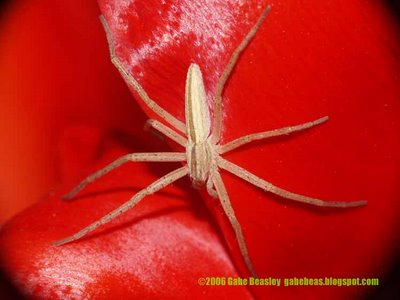 SPRING PHOTOS: Camera time is here--only a couple months to get the best pictures out here where I live before the heat wave of summer hits!
SPRING PHOTOS: Camera time is here--only a couple months to get the best pictures out here where I live before the heat wave of summer hits!Recently I've been getting some cool e-mail compliments I really appreciate. Sometimes I get them from people who tell me to go to there websites or write them back. I am sorry if I have been slow at writing back. Lost information due to re-building my computer on websites and other stuff has been part of the problem, PLEASE know if you don't put a URL or E-mail address--and you just sign in as "anonymous" I can't write back or find your site. Please e-mail me rather then use comments OR be SURE to put your URL and E-mail address in it so I can write you back and find your site. I got a lot going on right now--good and bad. It's great to go take some pictures when I feel overloaded with anything in life.
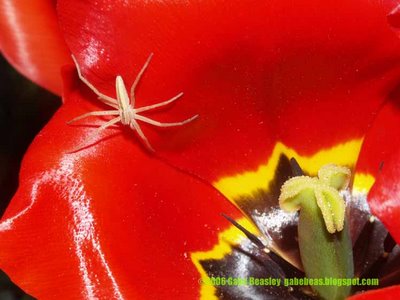
New fly pictures from the "X1" contraption I built have come up. It has proven itself hearty enough to be carried in field and was able to capture stunning high-res shots of flies and other insects I could approach. Wait for the next article.
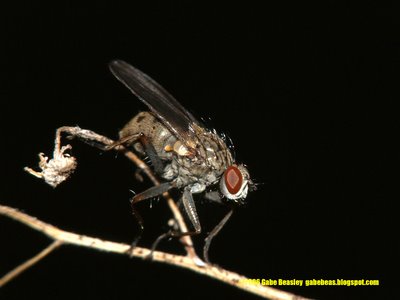
There are several tricks to doing good high macros. I say when your shooting digital--practice practice practice. If your shooting film test your settings and shoot digital first then do the film shots with the same lenses and settings.
These are all two element Diopter shots. It is very difficult to use a reversed lens system like in my "X1" camera rig in the field as you have to get very close to the subject. These high-resolution full-frame images are for sale. E-mail me for info or questions.
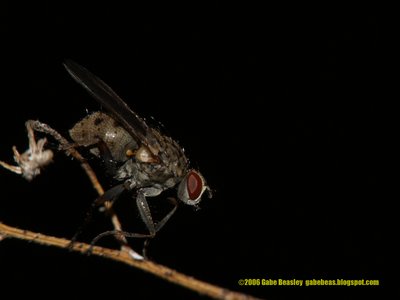
These two shoots took me a while to get. At macro levels this high you have a depth of field that is as thin as a few sheets from a phone book. These flies were alive and shot in my back yard! It is underexposed and I could quickly change that. Sometimes I use that to an advantage as the image may possibly be more interesting. It is hard to believe but this picture was taken in direct full sunlight outside. The reason why it is dark is the f stop settings. In order to get depth of field at these macro levels you need to be at least at f8. In this case I had to be at F20.
Here are a few hints about how this is done:
1-Stop from f8 to f22+ the higher the more depth of field
2-Select a slow ISO100-200 (I often use iso160)
3-Use a bright flash or external flash
4-PRACTICE, experiment and practice more. Keep practicing to keep your edge.
Setup a good enough macro system to shoot from 5 or six inches away.
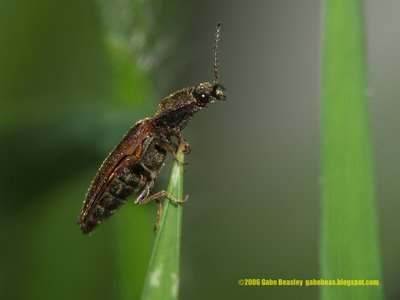 This is a "click bug". It's not a true "bug", rather it's a beetle which I'd hoped I could get flying off. Although I'm working on the X1 reversed lens camera setup--all these pictures were taken with my digital SLR. I found ways to make better use of my lenses and practice often. This click bug is about 1cm (10mm) long. The reason why it is called a click bug is because when held you your hand they click there heads very quickly. So fast it makes a noise. They can flip themselves out of dangerous situations and then fly away. A super-huge version exists in the forests in southern Oregon but I have only seen them in collections. The ones in the tropics--are over an inch and a half long and can break your skin while clicking.
This is a "click bug". It's not a true "bug", rather it's a beetle which I'd hoped I could get flying off. Although I'm working on the X1 reversed lens camera setup--all these pictures were taken with my digital SLR. I found ways to make better use of my lenses and practice often. This click bug is about 1cm (10mm) long. The reason why it is called a click bug is because when held you your hand they click there heads very quickly. So fast it makes a noise. They can flip themselves out of dangerous situations and then fly away. A super-huge version exists in the forests in southern Oregon but I have only seen them in collections. The ones in the tropics--are over an inch and a half long and can break your skin while clicking. A common bottle-fly. It too landed on grass in my yard. I was able to bring it into focus and take several shots of it. CLICK ON ALL THESE FOR A CLOSER VIEW.
A common bottle-fly. It too landed on grass in my yard. I was able to bring it into focus and take several shots of it. CLICK ON ALL THESE FOR A CLOSER VIEW.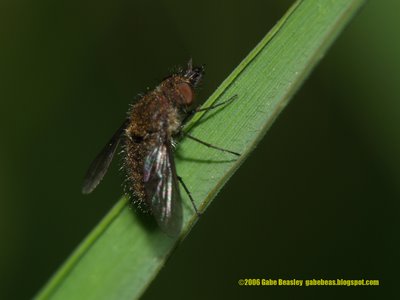
This fly on a blade of grass is VERY small. So ever-increasing my macro-factor my depth of field became harder and harder. Photoshop and other programs can help correct for some of the superficial problems with shooting tiny insects--but if it flies away before you get that "perfect shot"--you got to find the best one and be glad you have it. This bizarre species I have yet to identify. Notice the hairs!
Your pic's are great. If you would make some new comments on my site and other picture sites you will pick up more visitors. Keep up the good work.
ReplyDelete